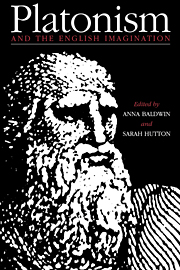Book contents
- Frontmatter
- Contents
- Notes on contributors
- Preface
- I ANTIQUITY
- II THE EARLY CHRISTIAN PERIOD AND THE MIDDLE AGES
- III THE RENAISSANCE AND THE SEVENTEENTH CENTURY
- 7 Introduction
- 8 The transformation of Platonic love in the Italian Renaissance
- 9 Uses of Plato by Erasmus and More
- 10 Italian Neoplatonism and the poetry of Sidney,Shakespeare, Chapman and Donne
- 11 Shakespeare on beauty, truth and transcendence
- 12 Platonism in Spenser's Mutability Cantos
- 13 Reason, Recollection and the Cambridge Platonists
- 14 Platonic ascents and descents in Milton
- 15 Platonism in some Metaphysical poets
- IV THE EIGHTEENTH CENTURY
- V THE NINETEENTH CENTURY
- VI THE TWENTIETH CENTURY
- Bibliography
- Index
15 - Platonism in some Metaphysical poets
Published online by Cambridge University Press: 15 December 2009
- Frontmatter
- Contents
- Notes on contributors
- Preface
- I ANTIQUITY
- II THE EARLY CHRISTIAN PERIOD AND THE MIDDLE AGES
- III THE RENAISSANCE AND THE SEVENTEENTH CENTURY
- 7 Introduction
- 8 The transformation of Platonic love in the Italian Renaissance
- 9 Uses of Plato by Erasmus and More
- 10 Italian Neoplatonism and the poetry of Sidney,Shakespeare, Chapman and Donne
- 11 Shakespeare on beauty, truth and transcendence
- 12 Platonism in Spenser's Mutability Cantos
- 13 Reason, Recollection and the Cambridge Platonists
- 14 Platonic ascents and descents in Milton
- 15 Platonism in some Metaphysical poets
- IV THE EIGHTEENTH CENTURY
- V THE NINETEENTH CENTURY
- VI THE TWENTIETH CENTURY
- Bibliography
- Index
Summary
There is a Platonic element in much Metaphysical poetry. Indeed, it is arguable that it is most metaphysical, in the philosophical sense, when it is most Platonic. In what follows I shall discuss this aspect of Metaphysical poetry in relation to three poets, Andrew Marvell (1621–1678), Henry Vaughan (1622–1695) and Thomas Traherne (1637–74). However, before doing so,it must be acknowledged that Platonism is often present in Metaphysical poetry only to be attacked:much Metaphysical love poetry contains a strong anti–Platonic streak. Not only is libertine repudiation of Platonic love a motif in Donne's Songs and Sonets, but the term ‘Platonic’ is used pejoratively,commonly as a synonym for ‘chaste’ if not ‘frigid’ (Cleveland,‘Antiplatonick’; Cartwright,‘No Platonique Love’). Such ridicule can be explained in part as a reaction to the vogue for Platonic love in Elizabethan love poetry and to the courtly cult of Platonic love promoted under Queen Henrietta Maria at Charles I's court (see above, p. 72). One exception to the rule of ridicule of Platonism in love poetry is Edward Lord Herbert of Cherbury who, in his several poems entitled ‘Platonic Love’ and in ‘Idea’ preserves the construct of Platonic love without sacrificing the licentious intent of the poems.
By contrast with the secular poets of the seventeenth century, the religious poets of the period often found a natural affinity with Platonism. The emphasis here is not on Platonic love but on those aspects of Platonic and Neoplatonic thought which appeared to men of the Renaissance to make it compatible with, if not a foreshadowing of, Christianity. In particular they draw on Plato's teachings on the immortality of the soul. The syncretic Christian Platonism of the Renaissance finds its strongest literary expression in religious poetry.
- Type
- Chapter
- Information
- Platonism and the English Imagination , pp. 163 - 178Publisher: Cambridge University PressPrint publication year: 1994
- 4
- Cited by

